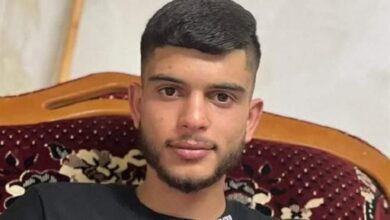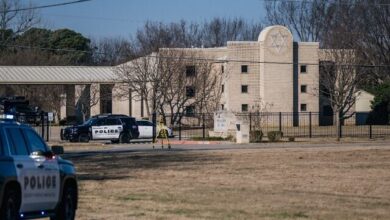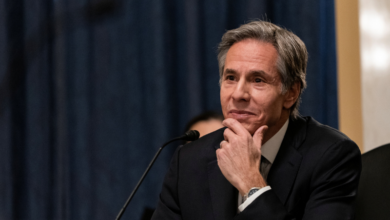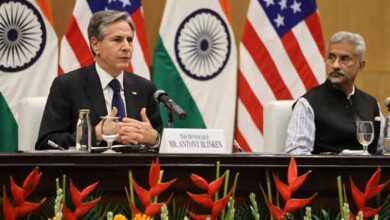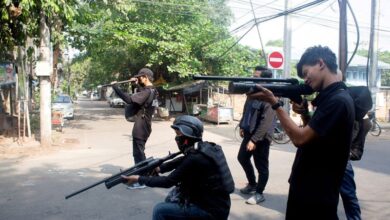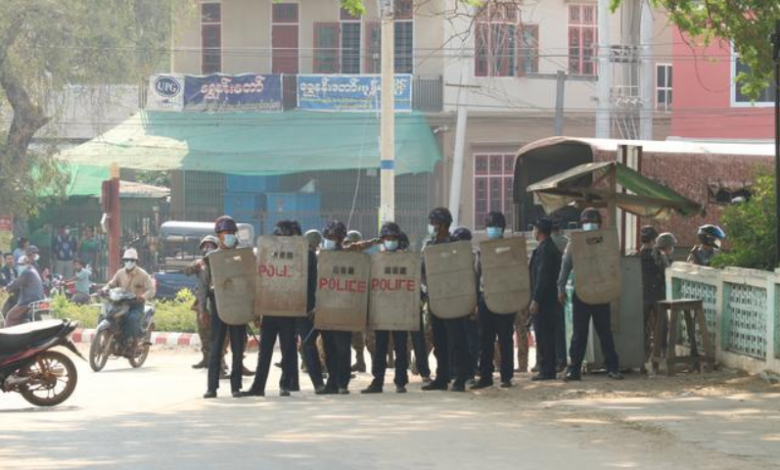
Myanmar police fired tear gas to break up a sit-in demonstration by tens of thousands of people in Mandalay on Sunday, while protests were held in at least half a dozen other cities in some of the most widespread action against last month’s coup.
Security forces cracked down on many of the protests.
Police fired tear gas and stun grenades on protesters in the country’s main city Yangon and in Lashio town in the northern Shan region, videos showed. A witness said police opened fire to break up a protest in the historic temple town of Bagan, and several residents said in social media posts that live bullets were used.
There was no word of any casualties.
A video posted by media group Myanmar Now showed soldiers beating up men in Yangon, where at least three protests were held despite overnight raids by security forces on campaign leaders and opposition activists.
The United Nations says security forces have killed more than 50 people to stamp out daily demonstrations and strikes in the Southeast Asian nation since the military overthrew and detained elected leader Aung San Suu Kyi on February 1.
“They are killing people just like killing birds and chickens,” one protest leader said to the crowd in Dawei, a town in the country’s south. “What will we do if we don’t revolt against them? We must revolt.”
A local campaign manager for Suu Kyi’s National League for Democracy died in custody after being arrested in Yangon on Saturday night, a legislator from the now dissolved parliament said in a Facebook post. The cause of Khin Maung Latt’s death was not known, but Reuters saw a photograph of his body with a bloodstained cloth around the head.
Residents in the city said soldiers and police moved into several districts overnight, firing shots. They arrested at least three people in Kyauktada Township, residents there said. They did not know the reason for the arrests.
“They are asking to take out my father and brother. Is no one going to help us? Don’t you even touch my father and brother. Take us too if you want to take them,” one woman screamed as two of them, an actor and his son, were led off.
Reuters was unable to reach police for comment. A junta spokesman did not answer calls requesting comment.
The state-run Global New Light Of Myanmar newspaper quoted a police statement as saying that security forces were dealing with the protests in accordance with law. It said the forces were using tear gas and stun grenades to break up rioting and protests blocking public roads.
‘Punched and kicked’
Well over 1,700 people have been detained under the junta by Saturday, according to figures from the Assistance Association for Political Prisoners (AAPP) advocacy group. It did not give a figure for overnight detentions.
“Detainees were punched and kicked with military boots, beaten with police batons and then dragged into police vehicles,” AAPP said in a statement. “Security forces entered residential areas and tried to arrest further protesters, and shot at the homes, destroying many.”
Myanmar authorities said on Saturday that they had exhumed the body of 19-year-old Kyal Sin, who has become an icon of the protest movement after she was shot dead in Mandalay on Wednesday wearing a T-shirt that read “Everything will be okay”.
State-run MRTV said a surgical investigation showed she could not have been killed by police because the wrong sort of projectile was found in her head and she had been shot from behind, whereas police were in front.
Photographs on the day showed her head turned away from security forces moments before she was killed. Opponents of the coup accused authorities of an attempted cover-up.
The killings have drawn anger in the west and have been condemned by most democracies in Asia. The United States and some other western countries have imposed limited sanctions on the junta. China, meanwhile, has said the priority should be stability and that other countries should not interfere.
Protesters demand the release of Suu Kyi and the respect of November’s election — which her party won in a landslide but which the army rejected. The army has said it will hold democratic elections at an unspecified date.
Israeli-Canadian lobbyist Ari Ben-Menashe, hired by Myanmar’s junta, told Reuters the generals are keen to leave politics and seek to improve relations with the United States and distance themselves from China.
He said Suu Kyi had grown too close to China for the generals’ liking.
Ben-Menashe said he had also been tasked with seeking Arab support for a plan to repatriate Rohingya refugees, hundreds of thousands of whom were driven from Myanmar in 2017 in an army crackdown after rebel attacks.

